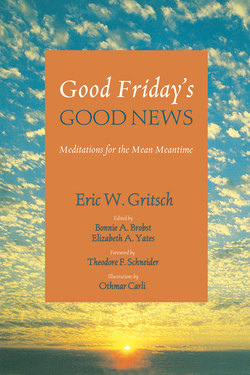Читать книгу Good Friday’s Good News - Eric W. Gritsch - Страница 9
The First Word
Оглавление“Father, forgive them; for they do not know what they are doing.”
—Luke 23:34
On April 9, 1945, about this time of day, a German Lutheran pastor named Dietrich Bonhoeffer was executed by Adolf Hitler’s secret police; it happened in a concentration camp in Bavaria at Flossenbürg. He was hanged and burned with gasoline with four others. So there was nothing left.
Did the Germans know what they were doing to a pastor like Bonhoeffer? Did he know what he was doing when he opposed Hitler? Did the crowd around the Cross of Jesus know what they were doing when they executed Him? We might never know. Jesus said, “Forgive them, for they do not know what they do.”
Forgiveness is at the bottom line of the entire Christian faith. It is not love. It is not even faith. It is forgiveness. Before Jesus died, He told the story about Mary Magdalene and the experience with people like her. And He said at the end to the Pharisees, “Those who forgive little, love little.” Forgiveness is the bottom line. And ever since Jesus died, we live by forgiveness. This is our business as Christians, and it is a very hard business, because sometimes we do know what they do to us, and therefore we do not want to forgive. Rarely do we “not know what they do.” And therefore we should forgive.
It is very difficult to be that kind of Christian who lives in this new era with God where a new future has begun, where we are baptized into a new life, into an adventure with God that goes beyond the usual boundaries of this world and its moral and its cultural and its political—even its religious—sense. Jesus goes beyond that, and occasionally—occasionally—people like Dietrich Bonhoeffer cross the boundary line because the times are so tough and so confusing. Bonhoeffer decided to participate in the assassination of Adolf Hitler. That is a rare decision for an ordained Lutheran German pastor to make, and many people criticized him for it. But he felt he had to do this, and he used one word—that Christianity is “beyond religion!” There is a “religionless Christianity” if religion means just to be good and just to believe and just to be decent sometimes. Obedience to Christ goes beyond all that or is above or below all that. So Bonhoeffer wrote in a book called Ethics—quote: “Christian ethics is not a matter of right or wrong. It is a matter of obedience.”
It is a very radical statement for Christians to make when they are to love their neighbors. And in baptism we are invited into that kind of life where the future has begun. What do we do in baptism? We undertake three steps to follow this Jesus. The first step is to say no to things—“Do you renounce evil and the devil and all his works?” That is the first step—to say no. The first step is not to say yes to Jesus; the first step is to get rid of some addiction, of some illusion, of something that bothers us, something that prevents us from following Jesus. The Christian no to some things is the first step of baptism. It used to be called exorcism—to get rid of some addiction, to drive out the confusion from one’s life, to drive out evil which means confusion. (The word diabolical means “to be thrown about, to be confused.”)
The first step is to get clarity and mission and discipleship into one’s life. Then comes the second step: to confess that God is in charge, as Creator. He redeems us from sin through Jesus Christ and gives us the Holy Spirit in order to survive. That is when we say yes to that God of the Trinity. Together with the Church—in public—we say yes to follow a centuries-old tradition of first saying no and then saying yes! And then a gift is given. If you remember, when baptisms are performed—what does the pastor or those who baptize say? “You are now sealed with the Holy Spirit and marked with the Cross of Christ forever.” We are sealed like a closed envelope. The Spirit is given, and whenever the Spirit decides to empower us, to give us power to live, then we do live as Christians.
